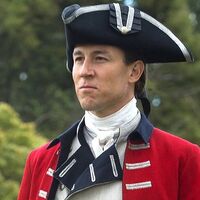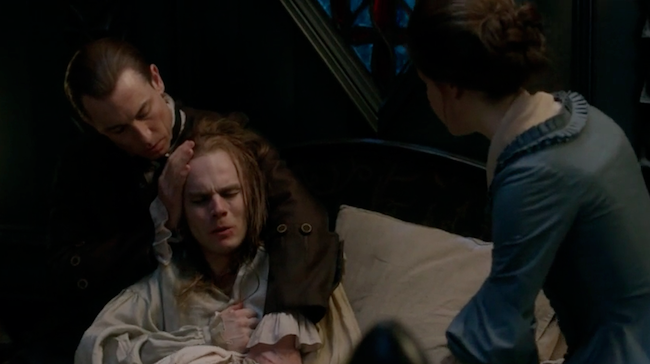How Does Black Jack Randall Die In Outlander


“Outlander,” on par with a science-fiction show like “Orphan Black,” has become a show that is about women’s bodies — the struggle for the women involved to have ownership over. Nov 15, 2019 Season three also saw the death of Menzies’ other alter-ego Black Jack Randall who was killed by Jamie Fraser (Sam Heughan) at Culloden in a bloody fight between the two rivals. However, there’s. Sep 11, 2017 Randall’s dead body is entwined with Jamie’s because, as the pair finally made good on two seasons worth of enmity, Outlander cleverly shot their final confrontation is an almost sexual pas de deux. Spoilers for the Season 3 premiere of Outlander follow. With Frank Randall being well-versed in his family's history, Claire knew that Captain Black Jack Randall was supposed to die during the. As Randall comes near, Jamie attacks him, but to little avail as Goon Marley throws him against a wall and chokes him, nearly to death until Black Jack intercedes. Because he wants him for himself.
Fans ofOutlander have been wondering whether or not Captain Black Jack Randall was based on a real person or not.
Season three of Outlander saw the death of Captain Black Jack Randall, which led to questions about whether or not the tyrannical redcoat was actually based on a real figure.
Captain Jonathan “Black Jack” Randall (played by Tobias Menzies) passed many seasons ago. The evil villain died at the Battle of Culloden at the hands of Highlander Jamie Fraser (Sam Heughan). Over the course of his time on the show, 'Black Jack' proved to be the most bloodthirsty and violent character on the show.
His cruelty was unparalleled, as he used violence to ensure that he got everything he wanted on the show. His torturous ways meant that he was feared and loathed across the world of Outlander.
This has led fans to wonder if there is any truth behind the theory that 'Black Jack' was actually based on a real person.

But how much is the character rooted in reality and how much was borne from US author Diana Gabaldon’s imagination?
Well, according to some sources, the character was not based on any real person from the Jacobite era, unlike other characters on the show. Outlander featured some real figures including the Duke of Sandringham (Simon Callow) and Bonnie Prince Charlie (Andrew Gower).
A newspaper called The Scotsman, however, has suggested the character could have been based on captain Caroline Frederick Scott, who is described by the publication as having a “brutal streak”.
In the book Culloden: Scotland’s Last Battle by historian Trevor Royale, Scott was said to have been led by a “visceral dislike of Highlanders” and had a personal desire to kill Bonnie Prince Charlie.
Sound familiar? Based on this description, there's certainly a chance that the idea for 'Black Jack' stems from Captain Scott.
Let us know what you think.
Take a look at this video of Jack Randall
Spoiler warning: This recap contains plot details for Outlander Season 3, episode 1, titled 'The Battle Joined.'
Try as Jamie Fraser might, he just can't seem to die.
He enters the Battle of Culloden devastated by the reality of having to say goodbye to his wife and unborn child, but also assured of their safety, having sent them (and the rest of his Lallybroch men) out of harm's way before the battle begins.
That leaves his way clear to die a heroic (if unnecessary) death among his countrymen, knowing the defeat that awaits them thanks to Charles Stuart's hubris. But even after one final, bloody, surreal showdown with Black Jack Randall, death refuses to come for our noble hero.
SEE ALSO: 'Outlander' Season 3: 10 burning questions we have about Claire and Jamie's reunion
Sam Heughan tells Mashable that everyone — cast and crew — relished the opportunity to bring Culloden to life after two seasons of build-up: 'It was tough, it was very physical, but it had a really nice theme to it as well. Ron [Moore] wrote it and it's got this great reality in the flashbacks of the battle.'
The culmination of Jamie's conflict with Black Jack has been years in the making, and Tobias Menzies admits that he had no idea how they would achieve closure on the show's most complex relationship before they filmed it.
'I think as always with Jamie and Jack stuff, you're looking for a slightly unusual angle on it. Not just a straight up 'two guys go at it and one of them dies',' he says. 'I like the way it was built into this hallucinatory sequence of Jamie remembering fragments from the battle. It's buried in there. I liked that it was a strange kind of dance/fight/embrace. It felt in-keeping with what's come before. It's genuinely a hard relationship to tie up.'
It's agonizing to see Jamie so broken in the wake of the battle, especially since he has to watch the few Highland men who survived the fight then being executed by the British — including our beloved Rupert. (The only consolation is that we can imagine him being reunited with his partner in crime, Angus, in the afterlife. 😭😭😭)
But Jamie's small act of mercy last season — sparing the life of a young John William Grey when he came across the Scots' encampment and tried to assassinate Jamie — proves that no good deed goes unpunished, and instead of shooting Jamie with the rest of his men, John's older brother, Lord Melton, reluctantly ships him back to Lallybroch to recuperate.
'He realizes that he's survived and he doesn't want to so, the next episode, he's on the run, he's a rebel and an outlaw,' Heughan previews. 'He can't be Jamie Fraser and also doesn't want to be, because he's lost everything that he wants and has lived for.'
Back in the future, a pregnant Claire is trying to rebuild her life with her first husband, Frank, believing that Jamie died at Culloden.
Showrunner Ron Moore tells Mashable that while Jamie's story over the first few episodes is lifted pretty much directly from Diana Gabaldon's third book, Voyager, Claire's parallel journey required some consolidation, making for some of the biggest changes in the structure of the novel.
'Most of the Claire/Frank story was something we changed in the adaptation so that there would be two parallel stories going all the way through this,' he explains. 'That storyline was pretty much informed by bits and pieces of backstory and events that were referred to in different areas of different books so it wasn't really [created] from wholecloth so much it was all collated and put into this particular section.'
We already know that Frank and Claire's story doesn't end happily, just from seeing Claire's strained relationship with her daughter, Brianna, in the Season 2 finale, but Season 3 will fill in some of the blanks left by those 20 years.
'We said at the outset this is the dissolution of a marriage, each of them is going to try at the beginning — they are trying from very different positions — and each of them is going to try to make it work,' Moore says. 'Ultimately it is just going to come unraveled, and we kind of wanted to track that, the stages of that development.'
We see Claire struggling just as much as Jamie at first; she and Frank go through the motions of playing a happy family in Boston, but it's clear that Claire is trying to keep some distance between them, shying away every time Frank tries to touch her. During an explosive fight just before Claire goes into labor, Frank demands to know when Claire is going to come back from the past.
'What I loved about it was just that the writers really allowed it to be very complex,' Balfe explains. 'You wanted it to feel like there was hope there, especially in the beginning, that maybe they could make it work.'
'The danger is, you're just watching people having a terrible time in their marriage for three episodes,' Menzies agrees. 'I feel like with the scene in the hospital with the baby arriving, you get a moment like, 'Oh, maybe it can work.' The more moments you have like that, it makes it a bit more interesting.'
But adjusting to being with Frank and trying to mourn Jamie aren't Claire's only concerns — she's quickly finding that in many ways, 1940s Boston is just as repressive as 18th century Scotland; if anything, the men seem even more condescending, and she finds herself being mansplained to by both her husband's boss and the doctor who delivers her baby. (Even more enjoyable when you're in agony!)

But Claire has never been a victim, and despite her grief over Jamie, she's not the kind of woman to compromise herself to fit other people's expectations.
'The audience knows that Jamie didn't die, but Claire doesn't. And so if you have her never trying to move forward in her life, that's a very tragic character,' Balfe points out. 'I think part of Claire's DNA is that she's a survivor, and that she gets on with it. She may have put a side of herself to one side, but she does create a positive and productive life for herself, which I like about her.'
What's most effective about the episode — which gives us just enough of Culloden to really drive home the human cost of the battle, without being gratuitous — is that Moore and director Brendan Maher give breathing room (sometimes literally) to the emotion of our characters' journeys, without feeling the need to rush to the next plot point.
We're forced to lie there with Jamie in his agony, every breath a struggle, to really feel the weight of his grief. We see Claire in those quiet moments of frustration and loneliness; even when she's with Frank, or her nosy neighbor, we feel Jamie's absence as keenly as she does. Balfe, Heughan and Menzies do some of their finest work to date with these sparse scenes, imbuing Claire, Jamie and Frank with so much pain and conflict that they don't need to say a word.
How Does Black Jack Randall Die In Outlander
We've still got a few episodes to wait before Claire and Jamie find their way back together, but it's clear that the journey won't be easy for either of them — or for us, watching them struggle without each other. We're gonna need more scotch. 💔
Outlander Season 3 airs Sundays at 8 p.m. on Starz.